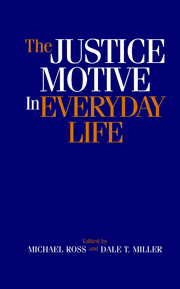Book contents
- Frontmatter
- Contents
- List of Contributors
- Introduction
- Theoretical Perspectives on the Justice Motive
- 3 Doing Justice to the Justice Motive
- 4 The Justice Motive in Persepective
- 5 Perverse Justice and Perverse Norms: Another Turn of the Screw
- 6 Justice Motivation and Moral Motivation
- Victim Derogation and the Belief in a Just World
- The Justice Motive and Prosocial Behavior
- Justice-Based Reactions to Transgressors
- Justice and Reaction to One's Own Fate
- Name Index
- Subject Index
4 - The Justice Motive in Persepective
Published online by Cambridge University Press: 08 September 2009
- Frontmatter
- Contents
- List of Contributors
- Introduction
- Theoretical Perspectives on the Justice Motive
- 3 Doing Justice to the Justice Motive
- 4 The Justice Motive in Persepective
- 5 Perverse Justice and Perverse Norms: Another Turn of the Screw
- 6 Justice Motivation and Moral Motivation
- Victim Derogation and the Belief in a Just World
- The Justice Motive and Prosocial Behavior
- Justice-Based Reactions to Transgressors
- Justice and Reaction to One's Own Fate
- Name Index
- Subject Index
Summary
Introduction
A major topic in the study of social justice is the description and explanation of why people behave justly. In many discussions, the justice motive is conceived of as the opposite of the egoistic motive. Economists believe that individuals strive to maximize their own profit and that social behavior is driven by an egoistic motive. Some sociologists and psychologists are convinced that individuals strive to maximize their own profit but, realizing that unrestricted egoism leads to awar of all against all, behave more altruistically (Walster, Walster, & Berscheid, 1978). Other social scientists have tried successfully to show not only that social behavior is governed by self-interest (Montada, 1998), but that individuals are motivated as well by rules of fairness and justice. But despite the overwhelming evidence to the contrary, the myth of individuals as profit maximizers still exists in the minds of broad categories of individuals, including scientists, in Western societies (Miller & Ratner, 1996). To unravel the intricate threads that create the complexities of the justice motive, Mel Lerner has made a major contribution. His definition of the justice motive in terms of deservingness and entitlement has received much attention in the literature. Moreover, the operations of the justice motive have made visible phenomena, such as blaming innocent victims, that were poorly understood before. It turns out that the justice motive offers a good explanation of people's justice beliefs and behavior, and that empirical evidence supports this explanation.
- Type
- Chapter
- Information
- The Justice Motive in Everyday Life , pp. 63 - 78Publisher: Cambridge University PressPrint publication year: 2002
- 2
- Cited by



